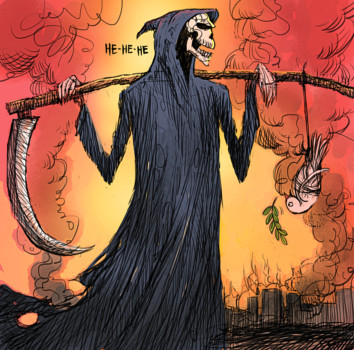
The only time I had any dealings with Ali Abdullah Saleh, Yemen’s long-serving strongman, was back in 2011 when the British government, as part of its response to the so-called Arab Spring, was putting him under pressure to reform his autocratic style of rule.
Saleh liked to say he owed his 33-year tenure as the country’s president to his ability to “dance on the heads of snakes” — his less-than-flattering reference to Yemen’s endlessly shifting mosaic of political alliances and tribal loyalties. So when William Hague, the then British foreign secretary, visited the Yemeni capital Sana’a in early 2011 and suggested that Saleh might want to adopt a more representative system of government, he was given short shrift. The country, said Saleh, needed strong leadership. Otherwise it would simply collapse into chaos and anarchy.
Which is precisely what happened when, later that year, he was forced from office, following a series of Arab Spring-related protests.
And without a strongman to keep the warring parties in check, the country quickly descended into even deeper chaos, a predicament that was not helped by Saleh’s decision to side with Al Houthi rebels in his attempt to reclaim power.
Saleh’s dalliance with this group was curious for two reasons. When in office, he had fought numerous wars against Al Houthi rebels in their heartland in northern Yemen as part of his effort to heal the long-standing divisions between the north and south. Moreover, Saleh’s decision to throw his lot in with them put him in direct conflict with the Saudis, who had been his staunch supporters during his decades in office.
This unlikely alliance with Al Houthis was particularly dangerous because the rebels rely heavily on Iran for funding and support in their attempts to seize control of Yemen. Iran’s interference in the Yemeni conflict resulted in the Saudis forming a coalition to protect their interests and maintain the country’s democratically-elected President, Abd Rabbo Mansour Hadi, in power.
The main consequence of Yemen’s dramatic downward spiral into endemic conflict is that the country now enjoys the status of being one of the world’s most impoverished, as well as being beset by numerous warring factions, including Al Qaida. The damage caused by years of conflict means nearly 21 million people are facing starvation.
The irony of Saleh’s brutal death — he is reported to have been summarily executed after being stopped at an Al Houthi checkpoint — is that he had recently declared his intention to split with Al Houthis and re-engage with his former Saudi allies in an attempt to end the country’s civil war. But while Saleh’s bold move could well have helped to achieve the change needed to end the bloodshed, his death means that there is now little prospect in sight of Yemen ending its appalling suffering.
On the contrary, with Al Houthis reported to be strengthening their hold on Sana’a at the expense of pro-Saleh ministers, all the indications are that Al Houthis and their backers in Shiite Iran will seek to consolidate their grip on the country, a development that will be resisted by Saudi Arabia and its allies.
Meddling in Arab affairs
For, apart from all its other misfortunes, Yemen has become one of the main fault lines in the Islamic world, one that has been primarily caused by Iran’s continued insistence on meddling in the affairs of Arab states. And, with no one with Saleh’s experience and guile able to cajole the warring factions to enter peace talks, the country’s plight is likely to worsen unless the outside world can be persuaded to intervene.
To date, United Nations-sponsored peace talks have been stymied by Iran’s reluctance to allow Al Houthis to agree to a ceasefire to a conflict that has resulted in 8,670 people being killed and nearly 50,000 injured since 2015. And there seems little prospect of reviving the talks that were held in Switzerland two years ago, so long as Iran is accused of supplying Al Houthis with sophisticated weapons, such as the missile that was fired at Riyadh airport last month.
If the chances, though, of ending this conflict now appear more remote than ever, following Saleh’s murder, this should not be taken as an excuse for bodies like the UN to say there is nothing more they can do to get the warring factions together.
Yemen has already suffered one deadly outbreak of cholera this year, and aid agencies warn that more will follow, together with mass starvation among the civilian population. It is therefore crucial that the UN and other world bodies redouble their efforts to halt the bloodshed, and create the conditions whereby humanitarian aid can be delivered to the civilian victims of this truly dreadful conflict.
— The Telegraph Group Limited, London, 2017
Con Coughlin is the Daily Telegraph’s defence editor and chief foreign affairs columnist.










